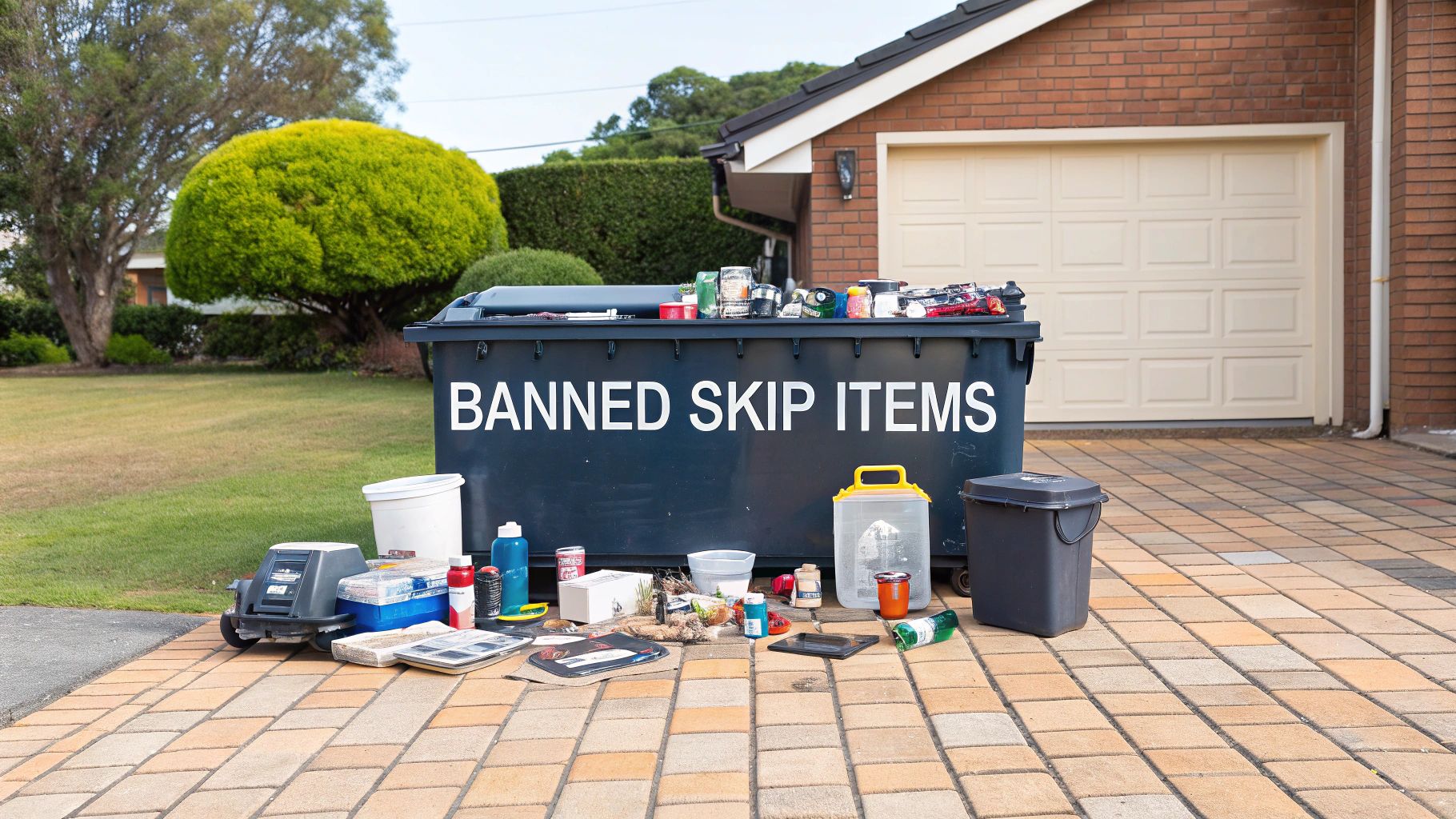A Guide to Skip Hire in Christchurch
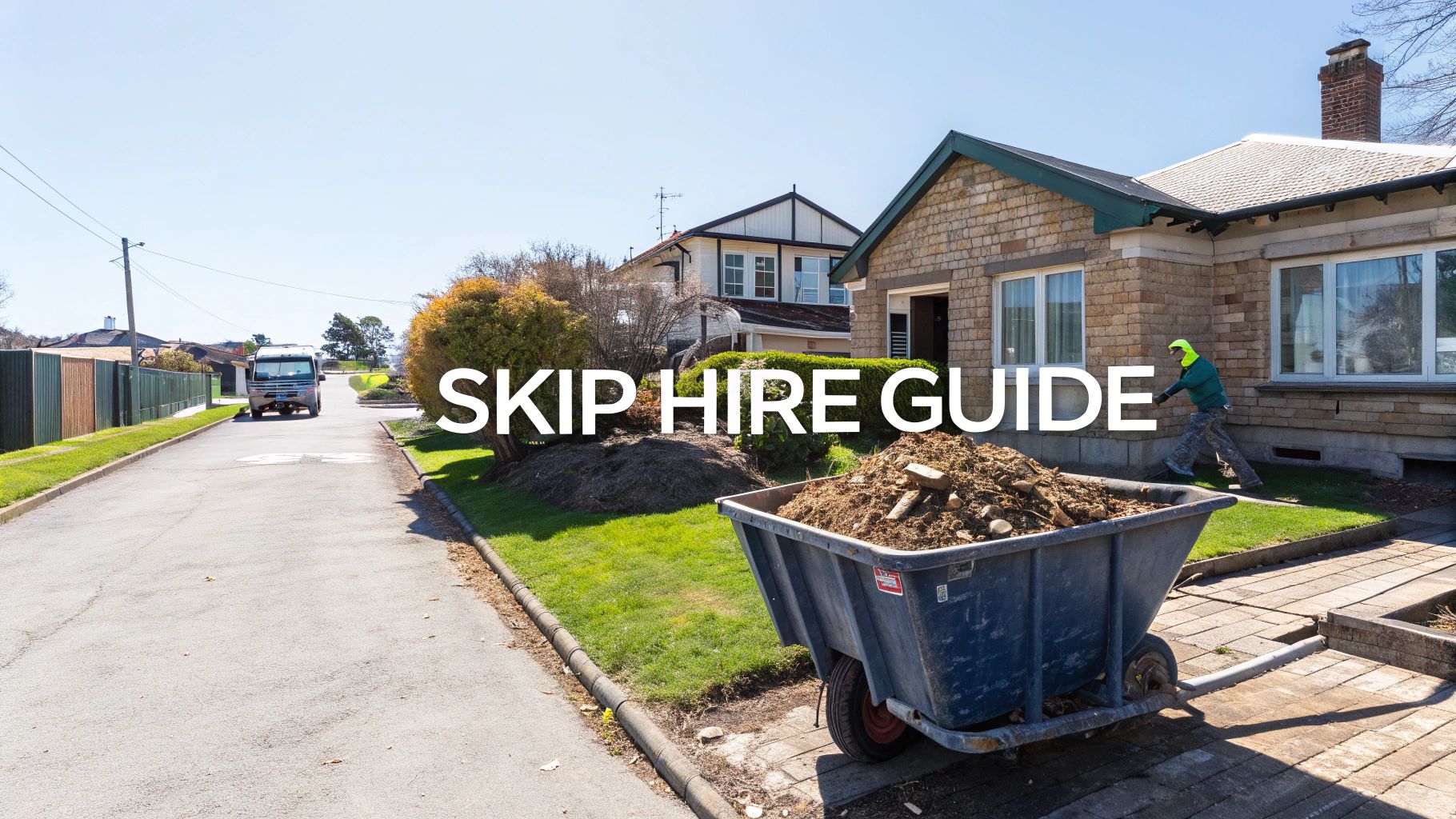
A Guide to Skip Hire in Christchurch
Hiring a skip in Christchurch is hands-down the easiest way to deal with the rubbish from a home renovation, a big garden clear-out, or even a small construction job. It gives you one big container for everything, saving you countless trips to the tip and keeping your project area from turning into a hazardous mess. This guide will walk you through exactly how it all works.
Why a Skip Is Your Best Bet for Waste Management
When you're starting a project that’s going to make a lot of mess, the waste can feel like a mountain to climb before you've even begun. Whether you're finally getting around to that overgrown garden, ripping out an old kitchen, or running a building site, figuring out what to do with the debris is a huge part of the plan.
Sure, you could load up the car and head to the local recycling centre, but that gets old fast. It's time-consuming, messy, and often impractical. This is exactly where professional skip hire in Christchurch really shines.
Instead of trying to stuff rubble into bin bags or scratching your car boot, a skip provides one central spot for all your rubbish. It makes the cleanup process a breeze, letting you get on with the actual job. It’s this simple efficiency that makes it such a popular choice.
The Local Demand for Skip Hire
The need for smart waste solutions is massive. Across the UK, we generate about 200 million tonnes of waste each year. To deal with it, around 17 million skips are hired annually, mostly for jobs around the house. Christchurch and the wider Dorset area are no different, especially with the boom in home improvements and DIY projects.
You can dig into more UK waste management statistics to see the full scale of it.
By opting for a skip, you're doing more than just making your own life easier. You're tapping into a regulated waste disposal system. Any decent skip company will make sure your waste is properly sorted and processed with a big emphasis on recycling. This approach keeps a huge amount of material out of landfills and helps us move towards a more sustainable way of doing things.
Key Takeaway: Hiring a skip isn't just about convenience. It’s about being organised, safe, and environmentally responsible with the waste from your project. It turns a logistical nightmare into a simple, manageable step.
Choosing the Right Skip Size for Your Project
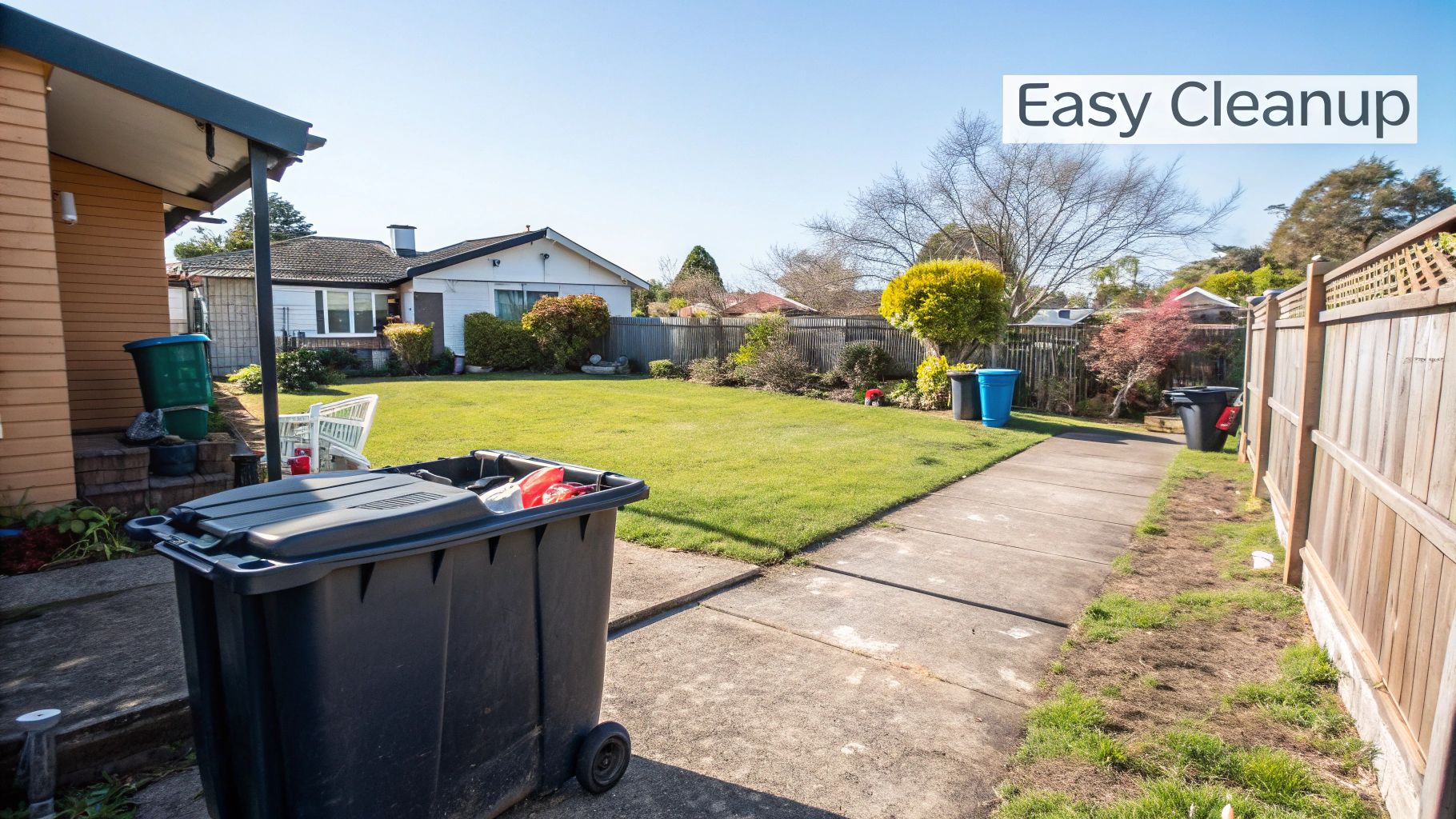
Getting the right skip size is probably the biggest decision you'll make when sorting out your waste collection. It's a call that directly impacts your budget and how smoothly your project runs.
Go too small, and you're stuck with the hassle and extra cost of ordering a second one mid-job. Go too big, and you're literally paying for fresh air. The trick is to think about the actual volume of what you're throwing out. A neat pile of rubble might not look like much, but it's incredibly dense, while bulky stuff like old furniture or garden cuttings will fill up a skip in no time.
Let's move past the guesswork and look at some real-world scenarios you're likely to come across right here in Christchurch.
To make things even clearer, I've put together a quick reference table. It's designed to help you match common Christchurch project types with the best skip size at a glance.
Christchurch Skip Size Guide with Project Examples
| Skip Size (Cubic Yards) | Typical Dimensions (Approx.) | Best For (Project Examples) | Capacity (Bin Bags) |
|---|---|---|---|
| 2-Yard (Mini) | 1.2m x 1.0m x 0.8m | Small garden tidy-ups, a single room declutter, minor DIY. | 20-30 |
| 4-Yard (Midi) | 1.8m x 1.3m x 1.0m | Kitchen or bathroom refits, major garden clearances, attic clear-outs. | 40-50 |
| 6-Yard (Builder's) | 2.6m x 1.5m x 1.2m | Small building works, large home renovations, bulky waste. | 60-70 |
| 8-Yard (Builder's) | 3.6m x 1.7m x 1.2m | House extensions, full house clearances, mixed construction waste. | 80-90 |
This table should give you a solid starting point, but let's break down what these sizes really mean for your specific job.
Mini Skips For Small-Scale Clear-Outs
The 2 or 3 cubic yard mini skips are your best friend for those smaller jobs. Their compact footprint makes them perfect for properties with tight access, like terraced houses with a small driveway or garden. They're the go-to when you've got more waste than the council bin can take but not enough to warrant a bigger, pricier skip.
Think of a weekend spent blitzing the garden. If you're trimming back hedges, clearing out old planters, and digging up a bit of soil, a 2-yard skip is usually bang on. It’s also ideal for a small bathroom strip-out—getting rid of an old toilet, sink, and some tiles.
- Capacity: Roughly 20-30 bin bags worth of waste.
- Ideal Projects: Small garden clearances, single room decluttering, or minor DIY tasks.
Midi Skips: The Versatile All-Rounder
When your project steps up a gear, the midi skip, ranging from 4 to 5 cubic yards, often hits the sweet spot. It offers a decent jump in capacity without becoming a massive presence on your drive. This balance of size and cost makes it one of the most popular choices for domestic skip hire in Christchurch.
Picture a full kitchen renovation. You're tearing out old cupboards, worktops, flooring, and maybe an old appliance or two. A 4-yard skip can handle that mix of bulky items and heavier materials comfortably. It's also a fantastic option for a bigger garden project, like dismantling an old shed or clearing a large volume of soil.
A great tip is to visualise your waste in wheelbarrows. A standard builder's wheelbarrow holds about 100 litres, which means you can get roughly 10 barrow loads into a single cubic yard.
If you want to dig a bit deeper, our guide on what size skip you might need has even more comparisons to help you choose.
Builder’s Skips For Major Renovations
For the big jobs—large domestic renovations or small-scale construction—the builder's skip is the undisputed industry standard. These 6 or 8 cubic yard skips are the true workhorses, built to handle heavy, mixed waste like soil, concrete, and rubble alongside lighter, bulky items.
If an extension is on the cards, or you're undertaking a complete landscaping overhaul or a full house clearance, this is the category for you. An 8-yard skip, for example, can swallow about 80-90 bin bags, making it more than capable of handling serious amounts of construction debris. It's also the largest skip you'd typically use for heavy waste due to the weight limits of the lorries.
Opting for a builder’s skip from the start ensures you have plenty of room, saving you from having to pause your project to wait for another skip to arrive.
Understanding Costs and Council Permits
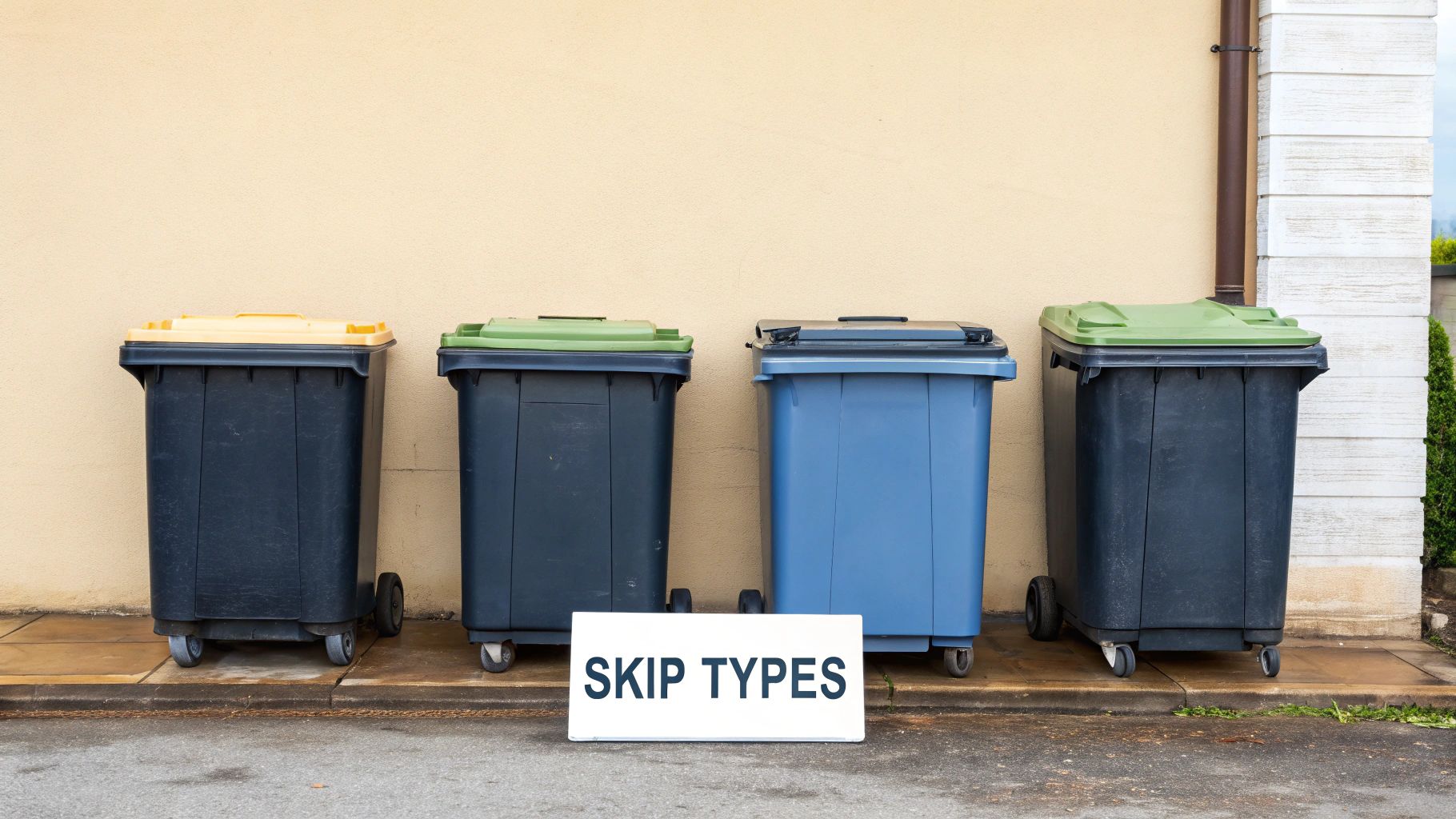
Before you can get your project underway, you need a clear handle on the full cost of hiring a skip in Christchurch. While the skip’s size is the biggest factor in the initial quote you'll get, a few other things can influence the final price you pay.
How long you need the skip for is a big one. A standard hire is often for one to two weeks, but if your project drags on, the cost might adjust. The type of waste you’re getting rid of matters too; heavy materials like soil or rubble cost more to handle than general mixed waste. Your postcode within Christchurch can also have a small impact, mainly due to travel time and delivery logistics.
Thinking about waste management early on is one of the best strategies to reduce overall construction costs, so it’s worth getting this part right from the start.
Navigating Christchurch Council Permits
The most important cost to factor in after the skip itself is the council permit. This isn't optional – if your skip is going anywhere on public land, you absolutely need one. That means the road, a grass verge, or the pavement outside your property.
Got a private driveway or a front garden? Perfect. You can pop the skip there without needing to speak to the council at all. It's always the easiest and cheapest route.
But for many of us, especially in terraced houses or homes with no off-road space, the public highway is the only option. In that case, a permit is a must.
Key Takeaway: Don't be tempted to skip the permit. Placing a skip on a public road in Christchurch without one can land you with a hefty fine and an order to get it moved immediately. Your skip hire company will almost always sort out the application for you, which makes life a lot easier.
The process involves them providing the council with the exact location and how long the skip will be there. They’ll handle the paperwork to ensure everything is above board.
Factoring in Permit Costs and Timelines
The permit fee is set by the local council and is an extra charge on top of the hire fee itself. These prices can change, but it's a fixed cost you'll have to budget for if you can't use private land.
- Allow Plenty of Time: This is crucial. A permit isn’t instant and can take several working days to be approved. Never assume you can get a skip delivered the next day if it needs to go on the road.
- Know Your Dates: Permits are only valid for a specific period. If your project overruns, you must get an extension sorted before the original one expires to stay legal.
- Safety First: Any skip on public land must have proper safety markings, like reflective panels and traffic cones. It will often need to be lit at night, too. Your hire company is responsible for providing a skip that meets all these requirements.
Getting a full grasp of the pricing is essential. For a deeper dive, it’s worth checking out guides on how local skip hire prices are calculated to see how all the pieces fit together. The best advice? Be upfront with your skip company about where it needs to go. They can give you the right advice on permits from day one, ensuring your project kicks off without any unnecessary stress.
What Can and Cannot Go in Your Skip
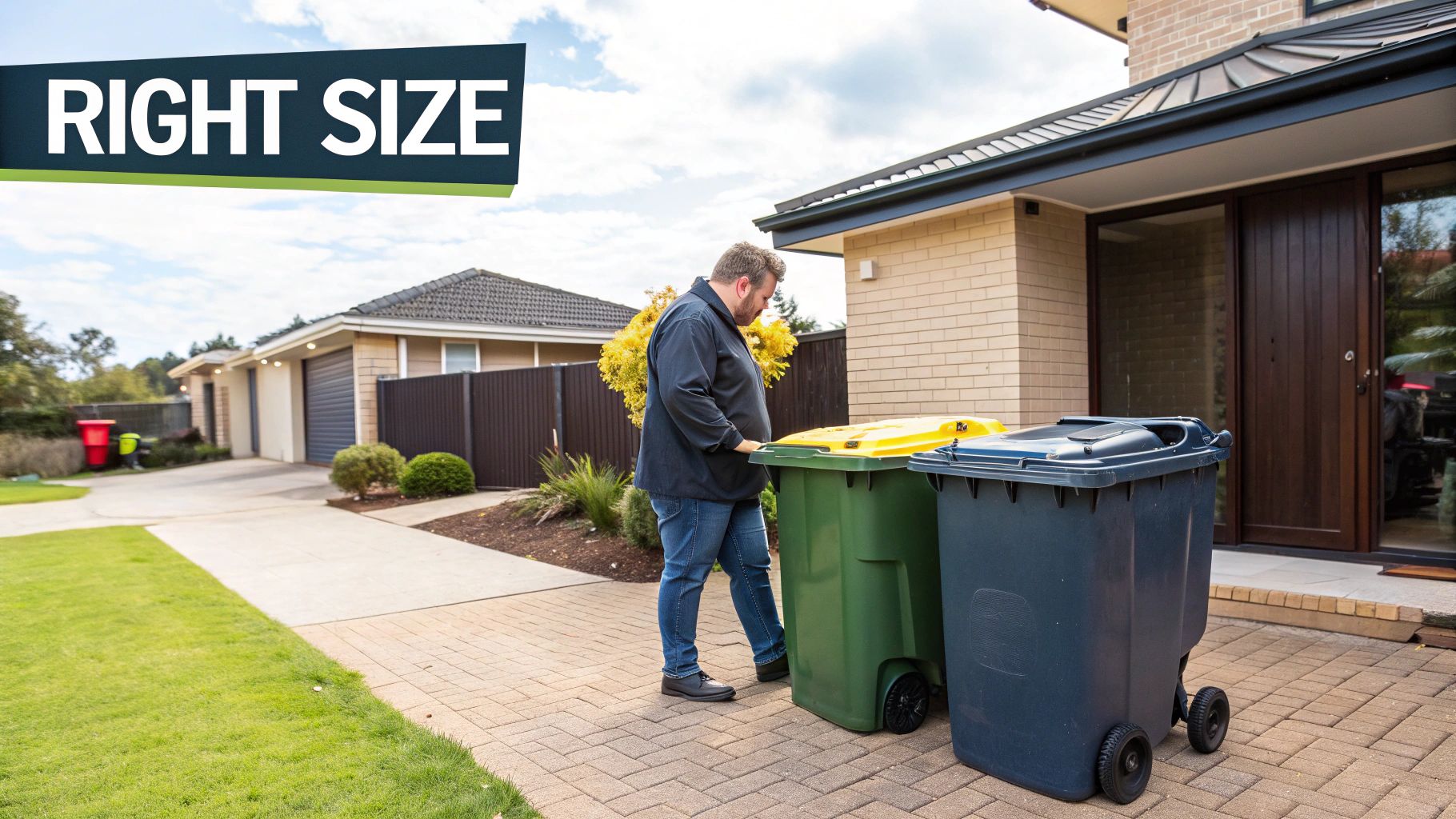
Once your skip lands on your Christchurch driveway, it's incredibly tempting to just start lobbing everything in. But hold on a minute. Knowing what can and can't go in is probably the most critical part of the whole process.
Getting it wrong can mean the skip company refuses to collect it, you get hit with unexpected fines, or you have the soul-destroying job of sorting through a full skip to pull out the problem items.
These rules aren’t just there to make life difficult; they exist for serious environmental and safety reasons. Waste transfer stations are set up to process certain materials, and chucking in something hazardous can contaminate a whole lorry-load of waste, wreck expensive machinery, or even put workers at risk.
Generally Accepted Waste
Right, let's start with the easy stuff. For the vast majority of jobs around the house or on-site in Christchurch, skips are the perfect solution for your non-hazardous clutter and debris.
You can confidently fill your skip with all the usual suspects from a renovation, garden blitz, or big clear-out.
Here’s a quick rundown of what’s almost always good to go:
- General Household Junk: Think old furniture, knackered carpets, kids' toys, and all that general bric-a-brac you'd find in a house clearance.
- Wood and Timber: Old floorboards, rotten fence panels, and dismantled sheds are all fine, as long as the wood isn't treated with hazardous chemicals.
- Garden Waste: Soil, clay, turf, grass cuttings, leaves, and branches are all perfectly acceptable.
- Builder's Rubble: This covers things like bricks, concrete, stones, and scrap metal from construction work.
- Packaging: Cardboard boxes and other packaging materials can be thrown in too.
Strictly Prohibited Items
Now for the really important bit—the absolute no-gos. These are the items that must never end up in a general waste skip because they need specialised disposal.
Mix these in with your general waste, and you’re asking for trouble. Any reputable skip hire company will be crystal clear about these restrictions to stay on the right side of environmental laws.
Top Tip: If you're even slightly unsure about an item, always ring the skip company and ask before it goes in. A quick phone call is a lot easier to deal with than a rejected skip and a hefty fine.
It's vital to know which materials are off-limits, especially when it comes to identifying hazardous materials like asbestos, which needs a specialist team.
Here's a definitive list of items that are banned from all general skips:
- Asbestos: A highly dangerous material. Never, ever handle it yourself. You need certified professionals for this.
- Plasterboard: It has to be disposed of separately. When mixed with other waste in a landfill, it can create poisonous hydrogen sulphide gas.
- Electricals (WEEE): Anything with a plug or batteries. We’re talking fridges, freezers, TVs, microwaves, and computers. They need to be recycled at a proper WEEE facility.
- Tyres: Banned from landfill for years now. They need to go to a specialist recycler.
- Batteries: Whether from a car or your TV remote, they can leak toxic heavy metals and acid.
- Chemicals & Liquids: This includes paint tins (even if you think they're empty), solvents, engine oil, and fuel.
- Gas Cylinders: These are a major explosion risk at waste facilities and must be returned to the supplier.
- Medical Waste: Needles, dressings, or any clinical waste requires professional, safe disposal.
For a more detailed breakdown, have a look at our comprehensive guide on what you can't put in a skip. Following these rules is the key to a hassle-free hire in Christchurch and helps everyone manage waste responsibly.
Making the Skip Hire Process Simple
Hiring a skip should be a painless job, but knowing the process from beginning to end is the best way to make sure everything runs smoothly. Your skip hire journey in Christchurch really boils down to a few key stages, from getting that first quote to the final, responsible disposal of your waste.
Getting your head around this flow means you'll be ready for whatever comes next.
To make it even clearer, here’s a look at the typical skip hire process.
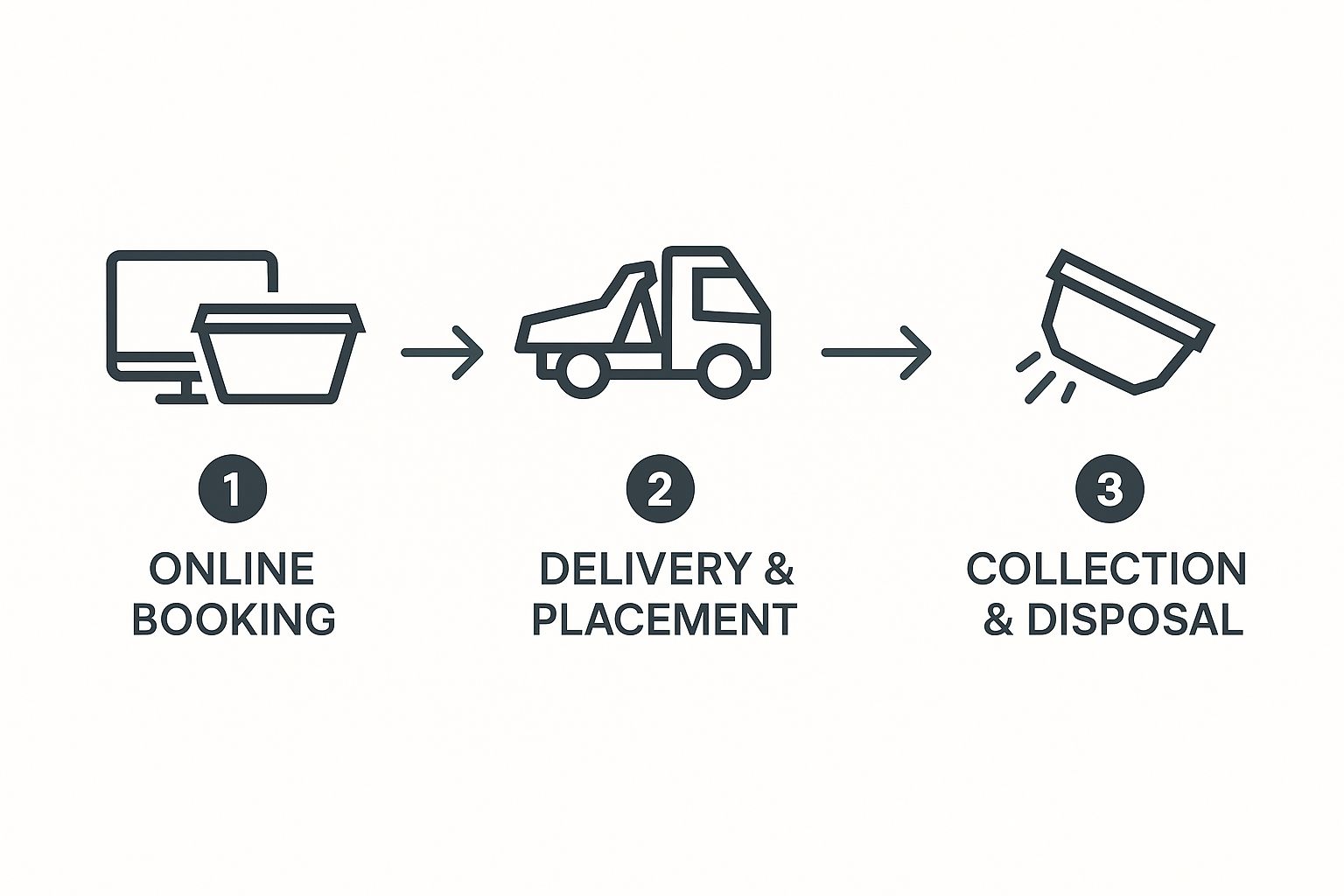
As you can see, it's a logical path: online booking, delivery and placement, then finally, collection and proper disposal.
Finding and Vetting Your Christchurch Skip Hire Company
First things first, you need to pick the right company. A quick search for "skip hire in Christchurch" will throw up a load of options, but it pays to look beyond the top result. Hunt for companies with a solid local reputation, straightforward pricing, and a good bank of positive customer reviews.
The UK skip hire market is a competitive one, and quality can vary wildly. Analysis of 520 UK firms shows some pretty clear trends in growth and profitability. The top players are financially solid, while others are growing fast—it really highlights the dynamic market that Christchurch companies are part of. This just goes to show why picking a stable and reputable provider is so important. You can find more insights into the UK skip hire market dynamics on researchandmarkets.com.
Before you pull the trigger, have a few questions ready to go:
- What’s the standard hire period and what does it cost to extend it?
- Are there extra charges for things like mattresses or plasterboard?
- Can you confirm you’re a registered waste carrier?
- If I need a permit from the council, will you sort that out for me?
Any decent company will give you straight answers without any fuss.
The Booking and Delivery Day Plan
Once you've settled on a provider, booking is usually dead simple. You'll just need to give them a few details to lock in a quote and arrange the delivery.
Be ready to share:
- Your full address and postcode so they know where they're going.
- The skip size you need (if you're unsure, flick back to our size guide).
- What kind of waste you’re getting rid of (e.g., garden cuttings, builder's rubble).
- Your preferred delivery date and exactly where you want the skip placed.
Getting the delivery spot ready is absolutely crucial. Measure the space to make sure the skip and the lorry can actually fit. You’ll need to shift any obstructions like cars, plant pots, or low-hanging branches. If the skip is going on your drive, it’s a good idea to put down some old wooden planks to protect the surface from scrapes.
Insider Tip: Try to be home for the delivery if you can. It means you can point the driver to the perfect spot, avoiding any mix-ups and ensuring the skip is placed exactly where you need it for easy access.
Best Practices for Filling Your Skip
With the skip safely on your property, it’s time to get loading. How you fill it makes a huge difference, not just for fitting more in, but for doing it safely.
Start with heavy, flat items at the bottom – think old doors or sheets of plasterboard. This creates a solid, stable base. Next, get your bulkiest items in, breaking them down where possible to save precious space. Then, just fill in the gaps with all the smaller bits and pieces. This methodical approach really helps you get the most out of the space.
The golden rule is to never overfill the skip. Every skip has a "level load" line clearly marked on the side. Piling waste above this line isn't just frowned upon; it's illegal and makes it unsafe for the driver to transport. They will simply refuse to collect an overloaded skip, leaving you with delays and the headache of having to empty the excess yourself.
The Collection and Final Paperwork
When you're all done or the hire period is up, a quick call to the company is all it takes to arrange collection. You usually don’t need to be there for the pickup, as long as the lorry driver has clear, easy access to the skip.
The last, and arguably most important, step is getting your Waste Transfer Note. This is a legal document confirming your waste has been handed over to a licensed carrier for disposal. It’s your proof that you've done your bit correctly, protecting you from any legal headaches later. A reputable firm will provide this as standard.
Common Skip Hire Questions Answered
Hiring a skip might seem simple enough, but when you're in the middle of a project, a few questions always seem to pop up. We get it. To make things easier, we’ve put together some straightforward answers to the queries we hear most often from our customers in Christchurch.
Getting these details sorted from the start means your project can carry on without any last-minute panics or unexpected problems.
How Long Can I Keep the Skip?
This is probably the first thing everyone wants to know. Typically, the standard hire period with most Christchurch companies is somewhere between one and two weeks. For the average home project, like a garden clear-out or a bathroom refit, that’s usually more than enough time.
But life isn't always standard, is it? Most companies are flexible. If you’re tackling a bigger job and know you’ll need the skip for longer, just say so when you book. It might cost a little extra to extend the hire, but sorting it out upfront is always the cheaper and less stressful option.
On the flip side, what if you get everything done early? No problem. You don't have to stare at a full skip for a week. Just give the hire company a ring, and they can usually arrange to pick it up sooner.
Important Note: The one time this flexibility goes out the window is when your skip is on a public road. Your hire duration is then tied directly to the council permit. The skip must be gone by the permit's expiry date to stay on the right side of local regulations.
What Happens to the Waste After Collection?
Once our lorry drives away with your full skip, its journey has only just begun. It's not a case of just tipping it all into a landfill. Your waste is taken to a licensed waste transfer station where the real work starts.
At the station, the skip's contents are meticulously sorted. The main goal is to rescue every last bit of recyclable material and keep it out of the ground.
- Heavy Materials: Things like soil, rubble, bricks, and concrete are separated. They're often crushed and repurposed as aggregates in the construction industry.
- Wood and Metal: All timber and scrap metal are pulled out to be recycled and turned into new products.
- General Waste: Only what’s left over—the truly non-recyclable stuff—is sent for final disposal.
Any decent skip hire company in Christchurch will be proud of their recycling rates, which are often well over 90%. This isn’t just good practice; it's a cornerstone of responsible waste management. As proof, you should always receive a waste transfer note, which is your legal confirmation that everything has been handled properly.
Do I Need to Be Home for Delivery and Collection?
It’s always a good idea to be there for the delivery if you can, especially if you haven't hired a skip before. It gives you a chance to have a quick word with the driver and point out the exact spot you want it. This avoids any guesswork and makes sure the skip lands precisely where it's easiest for you to load.
We know that's not always possible, though. If you have a clear, obvious spot on your own property—like an empty driveway with no overhanging branches or awkward gates—you can often arrange for it to be dropped off while you're out. Just be sure to give crystal-clear instructions when you book.
For collection, you generally don’t need to be there. As long as the lorry can get to the skip easily and you haven't filled it past the level-load line, the driver can get it hooked up and taken away without you.
How Do I Protect My Driveway?
Let’s be honest, a skip full of rubble or soil is incredibly heavy. All that weight can leave its mark on block paving, tarmac, or even concrete if you're not careful. Thankfully, a bit of foresight is all it takes to prevent any damage.
The simplest and most effective trick is to lay down some sturdy wooden planks where the skip’s corners and metal feet will sit. This spreads the load out, taking the pressure off any single point on your driveway.
Don't be shy about mentioning your driveway when you book. Experienced drivers are pros at placing skips carefully and are used to these requests. Some companies even bring their own protective boards just in case. It's a small step that can save you a big repair bill later on.
For a hassle-free and reliable skip hire service that puts your needs first, trust the experts at The Waste Group. We offer transparent pricing, flexible hire periods, and a commitment to responsible waste disposal. Get your instant online quote today!
